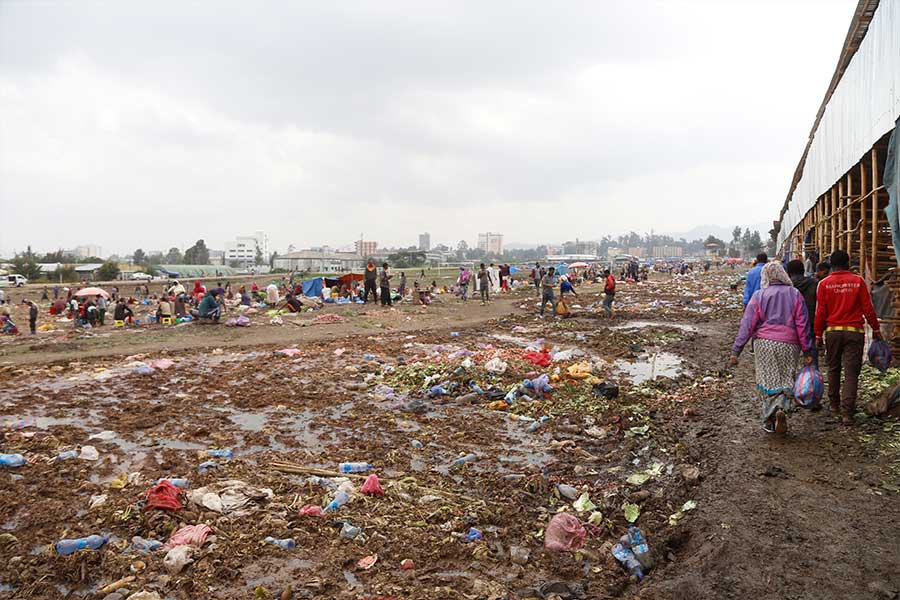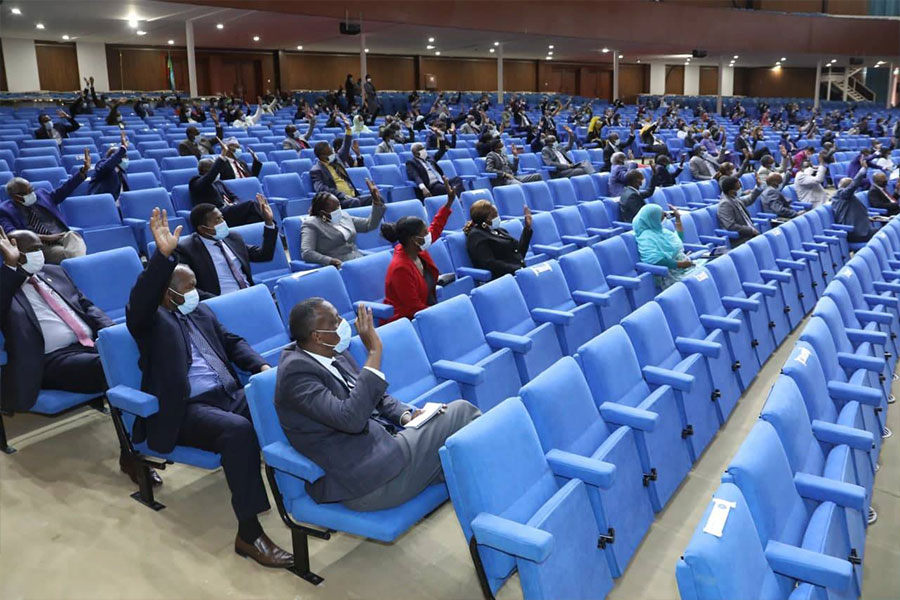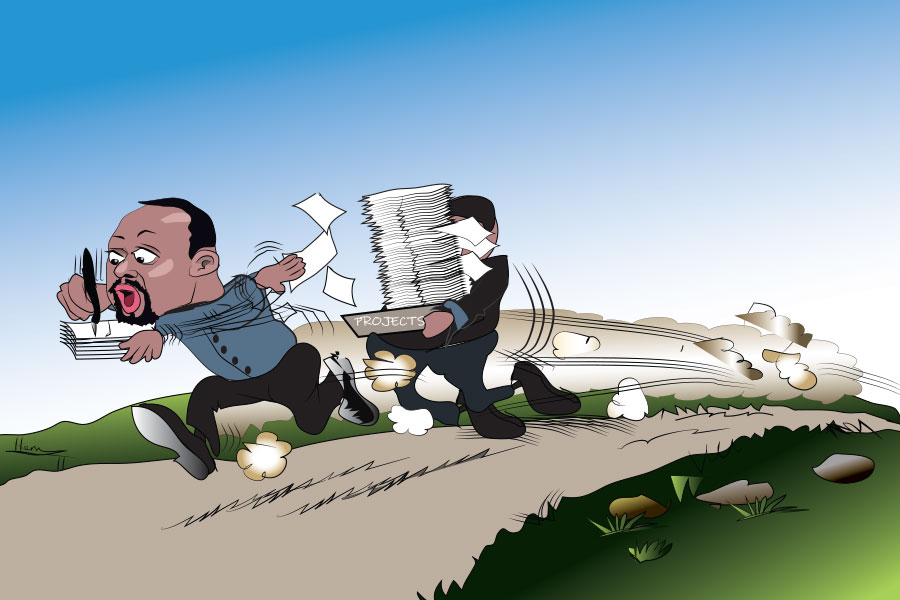
Feb 9 , 2019
By Dereje Gizaw
Prime Minister Abiy Ahmed’s (PhD) rise to power has been as fascinating as it has been fortuitous. But he has not been without his faults, which is quite dangerous in this time of transition, writes Dereje Gizaw (dereje2gizaw@yahoo.com), who lives and works in Canada.
Having started from within and having learned the ropes in the embrace of EPRDF politics, Prime Minister Abiy Ahmed (PhD) has had a spectacular rise to power. He is considered by many Ethiopians as a saviour and healer who will save the country from its demons and from destroying itself. He is a young and charismatic leader revered by his supporters, a person who rose to power, on many levels historical and timely.
But the exercise of canonising a living person to such a degree shortly after coming to power and raising expectations too high could be setting the PM up for failures. It is not fair to him as Ethiopia is at another historical crossroads and faces significant and seemingly insurmountable political problems.
It is not impossible for him to overcome many of these issues, but it will be an uphill battle. He will need the support of all Ethiopians and I believe most good people would wish him success and support him as it is in the best interest of the country.
Soon after coming to power, the new PM took measures that may have saved the country from chaos and possible civil war, albeit many of the changes may have been already planned and approved by EPRDF long before he became a Prime Minister. In rising to power, the PM did not bring about original visionary changes - he became the change. The change the country desperately needed at precisely the right moment. Not only did he become PM at the right time, but he did not waste any time in diving into the deep end of the pool and implementing changes.
There were other reasons for his popularity as well - his predecessors’ failures to address a number of significant and increasingly urgent issues in a timely manner, and a fatigue factor among many Ethiopians that the EPRDF, viewed by most to be singularly led by TPLF, was in power for too long.
There is nothing new or wrong about political parties staying in power for extended periods of time - German’s Christian Democratic Union is a good example - provided they are doing a good job. But EPRDF for its part may have made many mistakes over the years that needed to be addressed. It is therefore quite understandable that people were looking for a meaningful change and a break from the uncertainty and unrest that existed.
All of this contributed to the popularity of the new PM. He was received with open arms and a red carpet on arrival and hailed as a redeemer. He did indeed bring hope to the people, which was essential.
Contrast that with the late Prime Minister Meles Zenawi who had to earn respect from many following economic development and national security.
Even though he was recognised by many inside and outside the country, ultimately, Meles seemed to have earned the respect of some people when he passed away and people expressed their sadness at his premature death.
Ethiopia has now become respected and recognised again as a significant and stable power in Africa with its military strength and its dramatic economic growth, both recognized by various reputable international organizations, the International Monetary Fund (IMF) and the World Bank.
Meles’s successor, former Prime Minister Haile Mariam Dessalegn is by all accounts a decent person and an upstanding citizen but did not rise to the occasion even though he was afforded the same opportunity as Abiy to lead the EPRDF and the country.
In doing this, EPRDF allowed a leadership gap in its failure to provide strong leadership that may have contributed to, or resulted in, the crisis that ensued. Some may argue that this was a blessing in disguise since it allowed Abiy to assume power.
Despite its enormous contributions to the development of Ethiopia, EPRDF was never able to make peace with various groups, especially those in the diaspora – a problem that intensified while Haile Mariam was in office. These entities successfully exploited federalism along lingo-cultural lines as ethnic division, a strategy of divide and rule.
Of course, this was not necessarily new or bad, one can see how countries around the world from Canada to Europe are governed. There is also no obvious political or strategic advantage for any single ethnic group to gain by doing this. If anything, one could argue that most lingo-cultural groups gained significant political advantages as a result.
In the same token, some would argue that the current Prime Minister is not without his faults either.
Releasing prisoners in the name of creating peace, stability and righting past wrongs, whatever the debates against it, have their own downsides but if it can help achieve those grandiose goals, then it is the right way forward. However, there have been ongoing human rights and corruptions probes that have led to a number of officials being jailed.
Does this not defeat the purpose of the exercise - love, justice, fairness, forgiveness and unity?
If releasing all prisoners was a legitimate gesture and not just a political stunt, it should have been applied uniformly - as they say, what is good for the goose is good for the gander. This also creates an uneven playing field and by extension unequal justice that can potentially lead to economic, social and political unrest and destabilisation.
The PM as well appears to be biting the hands that fed him - a group that allowed him to grow as a politician and, arguably, a person - thereby potentially losing a solid base and loyal support critical for his own political survival. This would be acceptable if done for the right reasons but concerning it was done to appease different groups with unknown agendas and dubious motives.
Moreover, soon after Abiy’s assumption to power, the last 28 years have been depicted as a period of darkness. There are though many Ethiopians who would respectfully disagree with this characterisation.
While the democratic notion of people having to choose political parties may have been well-intentioned, his comments have been untimely and perceived by some as lacking in terms of his understanding of the complex relationship between some of the ethnic groups in the country and the parties that are constitutionally representing them in government.
As a Prime Minister of one of the largest countries in Africa, the PM now has the power, and he should allow and encourage a legitimate democratic exercise by the people and political parties.
The main question remains, is the PM in charge as a leader? Does he have the clout and respect, and not just love from the people, from the various political parties, factions and the military or is he being influenced and manipulated by domestic or international groups?
Whether the actions of the new government are marginalising some people, or it is simply a perception, many feel the PM needs to address this soon. If he is truly interested in peace and unity, which he seems to be, it may be wise for the PM to think and consider his comments carefully.
In digesting some of the words and actions of the new government, many people are pondering whether this will come to an end soon. It may be prudent for the PM to push even harder in making it clear that the government will not stand any ethnic or religious-based violence and reassure Ethiopians that he represents everyone equally and fairly.
No one wins in a war, something those in the opposition have to understand as well. And those who are beating the drums of conflict should recognise the long-term consequences of their actions and impact on the people of Ethiopia, not to mention the survival of the nation. Ethiopians, regardless of their ethnicity, are decent and peace-loving people, and they should be spared from unnecessary conflicts due to of actions by individuals or groups with distorted ideas.
Political parties should be thoughtful and look at the bigger picture - work hard and focus their efforts to achieve peace, unity and prosperity for all Ethiopians through a legitimate democratic exercise. Calm down and carry on - those who get mad first also lose first.
PUBLISHED ON
Feb 09,2019 [ VOL
19 , NO
980]


Radar | Jun 27,2020

Radar | May 23,2021

Fortune News | Apr 26,2019

Radar | Jan 16,2021

Radar | Nov 02,2019

Radar | Dec 14,2019

Radar | Oct 07,2023

Agenda | Jun 12,2021

Editorial | Jun 01,2019

Life Matters | Jun 10,2023

My Opinion | 131658 Views | Aug 14,2021

My Opinion | 128022 Views | Aug 21,2021

My Opinion | 125985 Views | Sep 10,2021

My Opinion | 123609 Views | Aug 07,2021

Dec 22 , 2024 . By TIZITA SHEWAFERAW
Charged with transforming colossal state-owned enterprises into modern and competitiv...

Aug 18 , 2024 . By AKSAH ITALO
Although predictable Yonas Zerihun's job in the ride-hailing service is not immune to...

Jul 28 , 2024 . By TIZITA SHEWAFERAW
Unhabitual, perhaps too many, Samuel Gebreyohannes, 38, used to occasionally enjoy a couple of beers at breakfast. However, he recently swit...

Jul 13 , 2024 . By AKSAH ITALO
Investors who rely on tractors, trucks, and field vehicles for commuting, transporting commodities, and f...

Jun 28 , 2025
Meseret Damtie, the assertive auditor general, has never been shy about naming names...

Jun 21 , 2025
A well-worn adage says, “Budget is not destiny, but it is direction.” Examining t...

Jun 14 , 2025
Yet again, the Horn of Africa is bracing for trouble. A region already frayed by wars...

Jun 7 , 2025
Few promises shine brighter in Addis Abeba than the pledge of a roof for every family...

Jun 29 , 2025
Addis Abeba's first rains have coincided with a sweeping rise in private school tuition, prompting the city's education...

Jun 29 , 2025 . By BEZAWIT HULUAGER
Central Bank Governor Mamo Mihretu claimed a bold reconfiguration of monetary policy...

Jun 29 , 2025 . By BEZAWIT HULUAGER
The federal government is betting on a sweeping overhaul of the driver licensing regi...

Jun 29 , 2025 . By NAHOM AYELE
Gadaa Bank has listed 1.2 million shares on the Ethiopian Securities Exchange (ESX),...